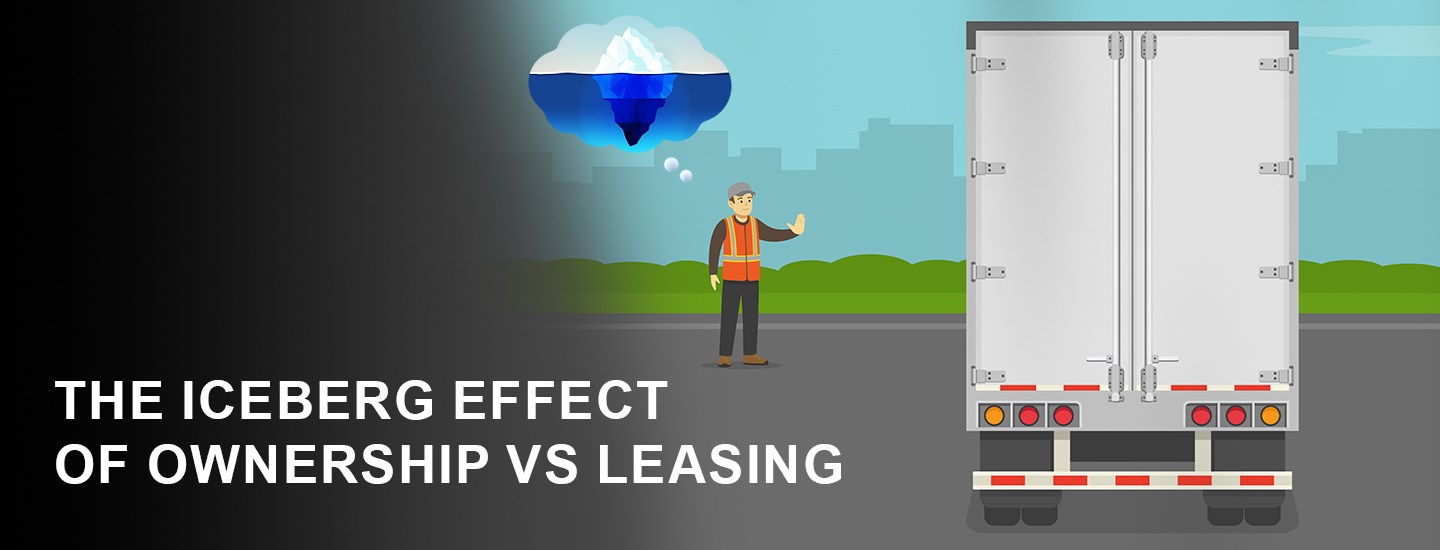January 16, 2024

The Iceberg Effect of Ownership vs Leasing
By John Bossong, PacLease National Account Sales Executive – Southeast
It’s no longer a question of “should a company outsource their fleet needs”. Many companies already outsource and it’s becoming more attractive every year. According to the 2023 National Private Truck Council Industry Benchmark Report, 49% of the Class 8 vehicle population is leased, while 51% is owned. In addition, full-service leasing represents 76% of all leasing types.
The report notes some interesting characteristics of leased fleets:
- Leased fleets operate on shorter trade cycles.
- Leased fleets are five times more likely to lease trailers.
- Leased fleets are more prone to lease their maintenance.
The critical question now becomes how deep a company wants to go with outsourcing their transportation needs. Some choose to outsource everything. Others utilize a combination approach. In fact, according to the NPTC Benchmark Survey, 30% report a combination of ownership and leasing heavy duty acquisition strategies (Source: 2023 NPTC Benchmark Report).
Why is full-service truck leasing such a popular option among private fleets? To answer this, we need to look below the iceberg.
Purchasing a truck is just the beginning. When you hand over that hard earned cash, your initial outlay is just the beginning. Let’s look below the iceberg.
Below The Iceberg of Truck Ownership
- Maintenance records and a maintenance system (MIS)
- Parts and inventory
- PM services
- Tires, rims, and casings
- Shop supplies
- Technicians, training, recruiting, payroll, and benefits
- Shop tools
- Facility
- Labor hours for additional repairs
- Emergency road service costs
- Towing
- Truck washing
- Computer equipment and diagnostic software
- Delivery costs – hiking
A Full-Service Lease is a lease that includes all maintenance, licensing, substitute vehicles, over-the-road service and washing. The lessor owns the asset for accounting and equity purposes. The lessee pays a monthly lease charge for the right to use the asset.
- It’s important to distinguish between a tax lease and a non-tax lease. In a tax lease, the owner of the equipment (lessor) receives the tax benefits (depreciation).
- Operating leases are considered tax leases.
- The payments made by the lessee are deductible for tax purposes. However, the depreciation is captured in the lease payments over the term.
Key Point: Leasing is about paying for the use of the asset, not ownership. Thus, the lessee gives up certain ownership benefits but gains operational and financial benefits.
Key Operational Benefits of a Full-Service Lease
- No residual risk
- Maintenance included (mitigates the iceberg)
- Vehicle specifications
- Technicians and training
- Network of locations
- Rental equipment
- Administrative
- Core competency (It’s not what you do)
Bundle It Up
The key to leasing is all the services mentioned (with the exception of maintenance, it is accounted for in the mileage charge) are bundled into a lease payment, including the depreciation and interest. Thus, if you unbundled all of these services less the financing, you would get a good idea of costs. However, your costs may not be as low as the lessor. Remember, they have scale and maximize their pricing, which, is directly passed on to you (the lessee). Also, it’s what they do. Their core competency.
Quick Tip - Net Present Value (NPV)
If you really want a good evaluation, perform a lease vs. own analysis. Otherwise known as a net present value analysis. Ask the leasing provider to do one for you as part of their proposal. You will need to provide the financial and maintenance data to the lessor. Once you do that, they’ll supply the analysis. Each lessor may require different information or perform the analysis a little different, but the output will be the same.
Key Financial Benefits of a Full-Service Lease
- Increases cash flow and conserves capital for other internal investments
- Predictable Budgeting
- 100% financing – no down payment
- Can improve certain financial ratios
- Tax deductible (check with your tax advisor)
- Fixed monthly payments eliminate variation in transportation costs
- Mitigates maintenance exposure – benefit from lessor parts and equipment pricing
- Leverages purchasing power of the lessor
- Eliminates residual exposure and remarketing costs
- Reduces extra vehicle rental expenses
- Mitigates breakdowns expenses and risk
So, remember, it’s all about the iceberg. Or, what’s below the surface. PacLease is equipped and trained to handle truck maintenance in a cost-effective manner. In addition to scale, systemic maintenance processes are set up to eliminate variation in maintenance activities. Maintaining tens of thousands of trucks and having years of predictive data and experience to work with is an advantage for PacLease customers. Think about a fast-food franchise. Each one is the same. You get the same service at every location. What you experience in Nashville, Tennessee is no different than what you experience in Dallas, Texas. Little variation. Consistency. Customers “feel” variation. When a truck is down, time is of the essence.
PacLease also leverages their size, training, buying power and relationships with OEM’s, vendors, and suppliers to get the best possible pricing on equipment, parts and supplies. These savings are passed directly to the lessee.
Quick Tip: One key in operating a truck is to determine the best “cycle” or term. In essence, when is the best time to cycle out of the truck? Large lessors are good at determining this inflection point. They have huge amounts of data that is predictive. Ideally, when the truck is costing more to maintain than to replace, it’s time to cycle into newer equipment. Leverage the expertise of PacLease and let them help you determine the best cycle time. The lessor’s goal is to minimize their total cost of ownership and maximize your uptime.
To find out more about Full Service Leasing.
Ask about PacLease truck rental and leasing options by contacting an expert.
Find a Kenworth or Peterbilt location near you, visit PacLease Locations.
For more great blogs visit PacLease Blogs.
